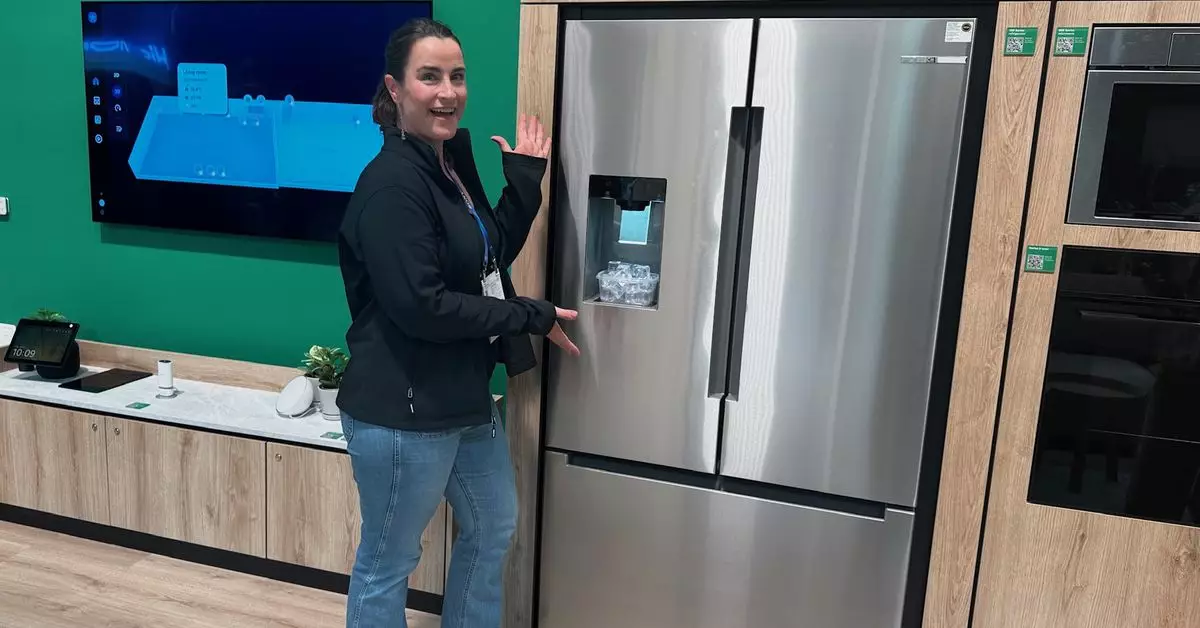The technology landscape within our homes is undergoing a significant transformation, thanks to innovations aimed at integrating various smart devices into a more cohesive ecosystem. One of the most exciting developments in this realm is the introduction of Matter, a smart home standard designed to facilitate compatibility across different devices and platforms. At the recent CES, Bosch unveiled its first Matter-enabled appliance, the 100 Series French Door Bottom Mount Refrigerator. This move marks a pivotal moment not just for Bosch but for the entire home appliance industry.
Bosch’s 100 Series: A Taste of Matter Integration
The 100 Series refrigerator, priced at $2,500, is not just another high-tech appliance; it embodies a new era of home connectivity. Launched in November, this refrigerator is equipped with a Matter-compatible chip and is set to hit the U.S. market by spring 2024. The significance of Matter lies in its ability to enable devices to communicate directly within the home network rather than relying on cloud connections, resulting in quicker response times and heightened security. This is particularly important given the increasing concerns surrounding data privacy and security in smart homes.
Moreover, Bosch has ambitious plans for the future. Eelco Lammertink from BSH—Bosch’s parent company—revealed that the company aims to roll out Matter functionality across its entire line of appliances in staggered phases, with refrigerators being the first category. Following this, it intends to introduce Matter to additional appliance classes in the coming years. This strategy is not only an indication of Bosch’s confidence in Matter but also reflects the growing consumer preference for seamless integration in smart home environments.
What does the integration of Matter mean for everyday users? The most immediate benefits lie in ease of use and compatibility. With Matter-enabled devices, users can control appliances like the Bosch refrigerator through their preferred smart home system—whether that’s Amazon Alexa, Google Home, or Samsung SmartThings—without worrying about interoperability issues. This multi-admin feature allows homeowners to mix and match devices from different manufacturers without the headache of proprietary software.
Additionally, the 100 Series refrigerator supports features like remote temperature control and notification systems. For instance, if someone accidentally leaves the fridge door ajar, a connected smart speaker can send a timely alert. While some existing smart fridges have similar functionalities, the local connection that Matter offers ensures that these interactions are more instantaneous and reliable.
Despite these advancements, the adaptation of existing appliances to Matter remains a challenge. Lammertink acknowledged the difficulty in retrofitting previous models to support this new standard, highlighting concerns about the risks involved, including the possibility of rendering appliances unusable. This is unfortunate news for consumers who own Bosch or Thermador appliances that may not receive the same level of integration.
As the industry begins to embrace Matter, the pathway toward greater energy management capabilities is being paved. Future updates may allow the refrigerator to participate in a broader smart home energy management system, thereby improving overall efficiency and reducing energy consumption—an increasingly salient concern in today’s environmentally conscious landscape.
Looking Ahead: A Collaborative Future
Matter represents a collaborative effort among giants like Apple, Amazon, Google, and Samsung, uniting them under a common goal of simplification and interoperability for smart home devices. This open-source, IP-based standard aims to streamline how devices communicate, thus enabling a more intuitive user experience. As consumers, the advantages of a Matter-enabled ecosystem are clear: increased choice, enhanced security, and improved functionality.
Bosch’s introduction of the 100 Series French Door Bottom Mount Refrigerator heralds an exciting evolution in smart home technology. By embedding Matter compatibility into its design, Bosch not only enhances its appliance lineup but also contributes to a larger movement toward smarter, more integrated home environments. As more manufacturers adopt this standard, the dream of a truly connected home becomes increasingly feasible, promising a future where our appliances can talk seamlessly to one another and simplify our lives more than ever before.

